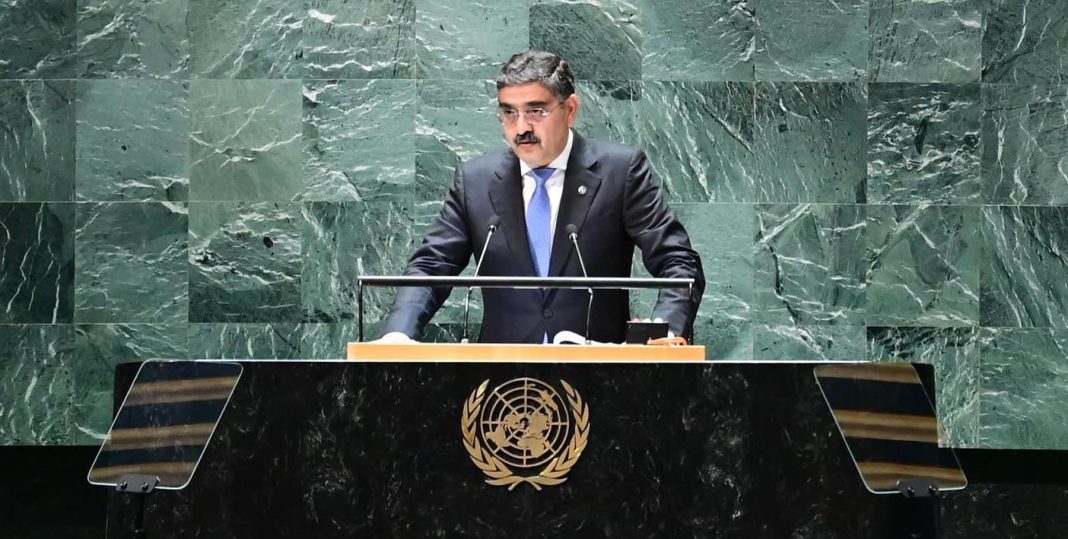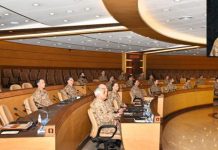
—— In UNGA address, PM Kakar calls for countering all terrorism, including Hindutva extremists
—— Warns ‘disgusting reality behind Hindutva politics can ensnare the world in fires of war’
—— Says India as a State has killed humanity on Canadian soil which cannot be condemned enough
—— Defends Pakistan’s strategic partnership, historic ties with brotherly country China
DM Monitoring
NEW YORK: Caretaker Prime Minister Anwaarul Haq Kakar, in his address at the 78th session of the United Nations General Assembly in New York on Friday, stressed the need to counter all forms of terrorism including “Hindutva extremists”.
“Mr president, we must counter all terrorists without discrimination including the rising threat by far-right and fascist groups such as Hindutva inspired extremists threatening genocide against India’s Muslims and Christians alike,” the premier stated.
He also urged opposition against the root causes of terrorism which according to him included poverty, injustice, foreign occupation and distinguishing genuine freedom struggles from terrorism. “Pakistan prospers the creation of a committee of the general assembly to oversee the balance implementation of all four pillars of the global counter terrorism strategy,” the PM added.
At the outset of the address, the premier said world leaders had gathered together at a “tense and pivotal moment in history”, referring to the Russia-Ukraine war and tensions between other global powers. “We see rise of old and new military and political blocs … geopolitics is resurging when geoeconomics should have primacy.”
He recalled that far reaching commitments were made to implement sustainable development goals (SDGs) during the climate summit yesterday and called for the realisation of these commitments through the “rechanneling of unused special drawing rights for development and resolution of debt problems of 59 countries in debt distress”.
“Pakistan’s triple food finance fuel challenge is a prime illustration of the impact of Covid conflict and climate on developing countries,” the prime minister highlighted, adding that the country was one of the worst affected countries from impact of climate change.
The premier lamented that the epic flood last year had submerged one-third of the country, killed 1,700 people, displaced over eight million people, destroyed vital infrastructure, destroyed vital infrastructure and caused over $30 billion damage to the economy.
“We are gratified by the commitment of over $10.5bn for the Pakistan’s comprehensive plan for recovery, rehabilitation, reconstruction with resilience. “Specific projects are being submitted to ensure timely funding and execution of the 4RF funding and I hope our development partners will accord priority to the allocation of funds for our recovery plan which costs $13bn,” he said.
PM Kakar further assured that the Pakistani government was committed to rapid economic recovery, stability of forex reserves and currency, expansion of domestic revenues and mobilisation of significant domestic and external investment.
In an interview to on the sidelines of the session earlier today, PM Kakar warned that the “disgusting reality” hidden behind Hindutva (Hindu nationalism) politics could ensnare the world in the “fires of war”.
He passed these remarks in response to a question pertaining to Canada’s recent allegations against India pertaining to the murder of a Sikh separatist leader.
In an unprecedented flareup of tensions on Monday, Canadian Prime Minister Justin Trudeau said Ottawa was “actively pursuing credible allegations” linking Indian government agents to the murder of Hardeep Singh Nijjar, 45, outside a Sikh temple in British Columbia in June.
The two countries, whose relations have been fraying in recent years over the issue of Sikh separatists, have since announced tit-for-tat expulsions of senior diplomats and issued tit-for-tat travel advisories. Indian Prime Minister Narendra Modi’s government denied any links to the alleged murder.
A day ago, PM Kakar had termed the rising wave of Hindutva a “matter of deep concern” for the international community, including the United States. Addressing the Council on Foreign Relations in New York on the sidelines of the UNGA, the premier had linked Modi’s ideology of Hindu nationalism with Canada’s allegations against India.
“These ideologues of Hindutva, they are becoming emboldened in a manner that they are now going beyond the region,” PM Kakar had said, highlighting that the “unfortunate killing” of the Sikh leader “is a reflection of that ominous tendency”.
Talking about the matter during an interview in New York ahead of his address at the United Nations General Assembly yesterday, PM Kakar said: “We will raise [the issue] at different forums, not because we want to do any propaganda against India, but because of the disgusting reality hidden behind Hindutva’s political agenda in which fascism and chauvinism are very deeply rooted, it is such a dangerous phenomenon that it can ensnare the whole region and the rest of the world in the fires of war.”
PM Kakar went on to say, “We will continue playing our role in highlighting that major issue … we will talk about it wherever we get the opportunity.”
The premier said Hindutva politics had affected the region, particularly Balochistan, adding that Pakistan had evidence to support its claims, which included the confession of high-ranking Indian military officer Kulbhushan Jadhav.
“We have been suffering this face and side of India but the problem is that this is hitting Western capitals now,” PM Kakar said.
Pakistan, he continued, would not mock Western countries for not paying heed to the warnings but would instead play a role in ensuring that the danger [of Hindutva] was understood and action was taken to stop it.
The prime minister said the slain Sikh separatist leader was “innocent” and a “martyr”, adding that the murder of an innocent person was a “major crime”. “India as a state has killed humanity on Canadian soil which cannot be condemned enough.”
Questioned about what Pakistan would do at the international level regarding the rise of militancy and its expectations from the global community, PM Kakar said the country’s own capacity to deal with terrorism on its own was “quite capable”.
“Pakistan is a successful case story that it has not allowed its state structure to be challenged by all the counterterrorism operations waged.”
He said Pakistan was in close coordination and open communication with countries around Afghanistan regarding the rise in terrorism, adding that the whole region was concerned with the issue.
In the interview (time stamp 55:30), PM Kakar said, “Pakistan enjoys a strategic relationship with China. We are very clear that there are people who would qualify Pakistan as China’s Israel.
“It is probably a more good analogy for [the] American audience because you do understand and appreciate the value of Israel for the United States.”
He made the remarks in response to one of the questions from the attendees of the talk — “What the relationship is now between Pakistan and China?”
He then went on to highlight how both neighbours “have a lot in common in terms of the emergent crises within the region” and “commonalities on certain issues”, citing the One-China policy and China’s stance on Taiwan, Tibet and Xinjiang issues.
As some have pointed out, the statement could be a possible reference to Chinese General Xiong Guangkai’s quote cited in the introduction of Andrew Small’s The China Pakistan Axis: Asia’s New Geopolitics.





